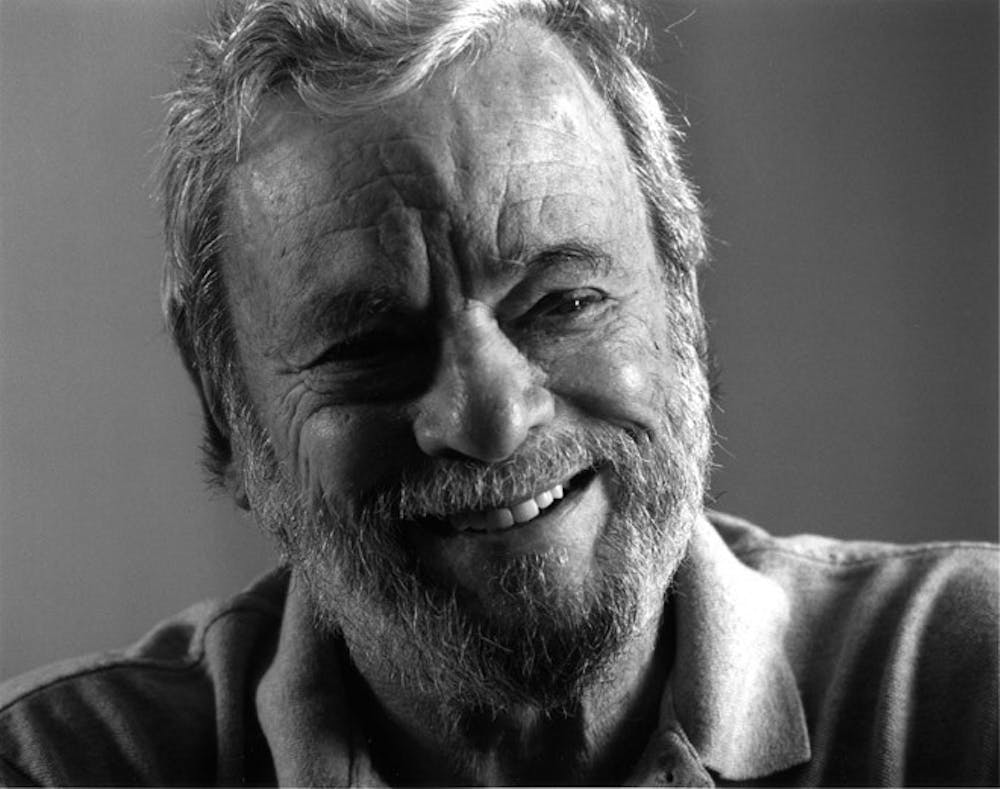You can listen to composer and lyricist Stephen Sondheim repeatedly and learn something new each time, music professor Gene Anderson says. And after Sondheim's double feature with host Frank Rich Monday at the Camp Concert Hall and the Landmark Theater in downtown Richmond, that became clear.
"We have the butcher of Broadway and the father of Broadway," said Kathleen Panoff, executive director of the Modlin Center, who introduced the pair for a Q-and-A session with University of Richmond music majors Monday afternoon.
Sondheim is known as the father of Broadway. Rich, who now writes a Sunday column for The New York Times, is the former theater critic for the paper, a man so acerbic he was known as the butcher of Broadway.
The two spoke convivially, relaxing into their chairs with legs crossed toward each other. Sondheim, 78, has been one of the most important artists in American musical theater from the last half-century and was instrumental in shepherding Broadway musicals to the modern age. Rich just called him Steve.
Sondheim said he was 41 when he first contacted Rich, then a student at Harvard University. He contacted Rich because Rich had written a review about "Follies" in the Harvard Crimson that Sondheim said had actually grasped his play.
"He understood the show better than we did," Sondheim said of Rich.
According to a Rich column from 2001 about this interaction, "He was the first professional writer to give me the courage to believe I might be one too," wrote Rich, who visited campus in November and lived in Richmond after college to establish The Richmond Mercury, an alternative newsweekly.
For Sondheim, that influence was Oscar Hammerstein II, from the Rodgers and Hammerstein duo made famous by "Oklahoma!" and "South Pacific." After moving from Manhattan to Bucks County, Pa., at age 10 when his parents divorced, Sondheim, an only child, befriended Jimmy Hammerstein.
"Oscar became a surrogate father, and I just wanted to do what he did," Sondheim said. "If Oscar had been a geologist, that's what I would've been."
Sondheim and Rich are tied in this way, as well. Rich said that after his parents divorced, he found solace in theater.
He even wrote that, "'If Mama Was Married,' a song from 'Gypsy,' was the first song I'd ever heard about being a child of divorce, which I had recently become, and it pointed me toward Sondheim before I knew his name."
Enjoy what you're reading?
Signup for our newsletter
Many people still don't know Sondheim's name, said Anderson, the music teacher. Sondheim is considered a critical, but not a popular success, and although many students are familiar with "West Side Story" and "Sweeney Todd," they don't associate them with Sondheim. Andrew Lloyd Weber's work has been more popular commercially, but critics revere Sondheim as a legend.
Sondheim has been awarded seven Tony Awards -- more than any other composer -- a Lifetime Achievement Tony Award, multiple Grammy Awards, an Academy Award and a Pulitzer Prize.
Textbooks even credit Sondheim as the inventor of the concept of a musical, said Anderson, who has taught "Sondheim and the American Musical" three times and uses Sondheim's musicals as freshman Core class texts.
But being viewed as "the inventor" is not a distinction Sondheim is fond of, and his presentation reinforced this modesty. He insisted that it takes 100 people to put a musical on stage.
"You better collaborate or the ship sinks," he said.
He first collaborated in his 20s, when he contributed lyrics to "West Side Story" in 1957 and "Gypsy" in 1959. In 1962, he became a double threat, supplying both the lyrics and the music for "A Funny Thing Happened on the Way to the Forum."
"It takes special talent to either write lyrics or compose music, and Sondheim can do both very well," Anderson said, declaring Sondheim one of the best U.S. composers and the most outstanding lyricist of his time.
But he would appear publicly only if Rich interviewed him on stage, Rich told Style Weekly in November. Modlin Center marketing director Tiffanie Chan said Sondheim did not talk frequently about his work.
"I hope you'll tell your grandchildren about it," Panoff told the audience at the end of the Q-and-A.
Junior and senior music majors Mierka Ross and Katelin French probably will.
"It was definitely an excellent experience to have," Ross said.
French said she couldn't wait to go on Facebook and brag to her friends that she had just been steps away from a living legend. She also attended the evening program at the Landmark.
Inside the Landmark
Entering the Landmark Theater Monday night, expecting the same event, the only familiar images were the two stuffed chairs on stage flanked with microphones and separated by a coffee table with water for Sondheim and Rich. Otherwise, the lights were dimmed under the painted interior, and the stage, twice the size of the one in Camp Concert Hall, was dark, with only a spotlight on the chairs.
Although Rich replaced the afternoon's student and faculty questions with his own, he deflected the spotlight to Sondheim. His thoughtful prompts moved the show along, but he stayed skillfully invisible behind the rapid and raspy responses of an animated Sondheim.
The show's increased formality was noticeable: Sondheim donned a blazer and Rich clasped a sheet of questions. Instead of reclining, they perched on the edge of their chairs for the majority of the 90-minute conversation.
Still, the afternoon's levity was not lost, as Sondheim joked each of the four times stray confetti floated down from the ceiling and that the lack of intermission meant leaving early wasn't an option. But no one tried, only getting up to applaud after the show.
For a man with a reputation of shunning the limelight, Sondheim engaged the audience. Sparking its laughter more than two dozens times with anecdotes about people he worked with, he illustrated his view of the audience as the final collaborator in a show. He even sang.
The conversation began where his lyrical contribution did: "West Side Story." Although it may be the show that most with passing Sondheim knowledge recognize, Rich pointed out that it wasn't a smash hit when it started. In fact, almost all of Sondheim's shows lost money and closed early, but they won awards and continue to be revived.
Anderson said this was because Sondheim's themes -- conflict, aging, love and death, among them -- were universal, yet revolutionary for their time, as in his 1990 show, "Assassins." Its topic of disillusionment made it one to which Sondheim felt most connected.
Anderson said students could connect to the real and serious themes because they encourage people to think about society -- the source of the trouble in "Sweeney Todd."
Richmond students have performed three of Sondheim's musicals -- "Merrily We Roll Along," "Company" and "Forum" -- but not since the mid-1990s. Anderson said he wished they would produce more, but Sondheim musicals required the dual demands of great singing, with the songs frequently performed by operas, and strong acting.
But Sondheim says he prefers an actor to a singer.
"For me, it's always been the song, not the singer," said Sondheim, explaining his preference for musicals.
Hammerstein instilled in him the idea that a song should have forward motion like a one-act play and be integral to the story, or be struck altogether.
"It was a kind of ruthlessness I got from him," Sondheim said.
Songs are crucial to advancing the storyline, said Modlin operations manager and graduate student Dana Rajczewski, who was among the three students in Anderson's most recent class last spring. He applies the same ruthlessness to words within the songs; nothing is extraneous, she said.
Sondheim also said he inherited Hammerstein's love for perfect rhymes, not approximate ones. But for the most part, Hammerstein insisted that Sondheim not imitate him, writing instead what he sees.
Instead of imitating Hammerstein's interest in groups to which he didn't belong, Sondheim said he developed his own talent of mimicking book writers so that he could get inside the characters' heads to create music for them.
Sondheim considers "Company" his most influential play, saying it explored the area between not having a plot but telling a story, a style employed by many shows that followed.
Basing his musicals on relationships instead of a plot, Anderson said, Sondheim offers unconventional solutions to conventional problems. Relationships are the main theme of "Company," and Sondheim advocates the necessary balance between maintaining identity and relationships.
Echoing this emphasis on relationships, the couple seated next to me, University of Virginia professors Wendy Novicoff and Bob Davis, said they met while acting in "Into the Woods," one of Sondheim's musicals. As they merrily sang along to the Sondheim songs playing before the show, it was hard to remember that Anderson had used this musical to explain that there were no Hollywood endings when it came to Sondheim.
But the musical Novicoff and Davis said was the least Sondheim-like, "Forum," was actually what Sondheim called his favorite. Because it doesn't adhere to Hammerstein's principle of song integrality, it was also the most difficult to write, Sondheim said.
Anderson warned it might be difficult to follow the show without being familiar with these Sondheim concepts. Senior non-music majors Jennifer Fitts and Laura Noges said they felt lost at times in the older crowd and the era Sondheim talked about, but for an interview, they said it was well done and entertaining.
Sondheim's advice to students was to keep at what makes you feel connected, so long as it's entertaining, and especially if it scares you. "The more you write, the better you get," he said, advice he says he follows himself.
Sondheim is currently working on a book of collective lyrics and essays for Alfred A. Knopf Inc. He and Rich's next appearance will be on Feb. 21 in Philadelphia.
Contact staff writer Maura Bogue at maura.bogue@richmond.edu
Support independent student media
You can make a tax-deductible donation by clicking the button below, which takes you to our secure PayPal account. The page is set up to receive contributions in whatever amount you designate. We look forward to using the money we raise to further our mission of providing honest and accurate information to students, faculty, staff, alumni and others in the general public.
Donate Now



